最新译林 6B Unit 1 The lion and the mouse 第一课时 公开课课件
译林版六年级英语下册Unit 1 The lion and the mouse 教案
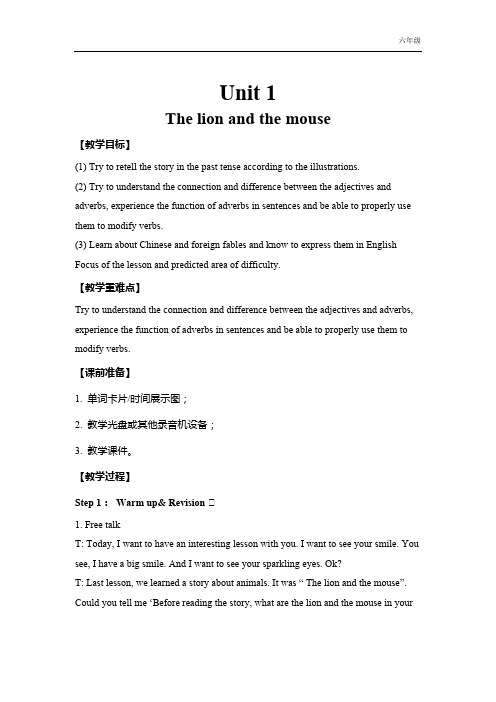
Unit 1The lion and the mouse【教学目标】(1) Try to retell the story in the past tense according to the illustrations.(2) Try to understand the connection and difference between the adjectives and adverbs, experience the function of adverbs in sentences and be able to properly use them to modify verbs.(3) Learn about Chinese and foreign fables and know to express them in English Focus of the lesson and predicted area of difficulty.【教学重难点】Try to understand the connection and difference between the adjectives and adverbs, experience the function of adverbs in sentences and be able to properly use them to modify verbs.【课前准备】1. 单词卡片/时间展示图;2. 教学光盘或其他录音机设备;3. 教学课件。
【教学过程】Step 1:Warm up& Revision1. Free talkT: Today, I want to have an interesting lesson with you. I want to see your smile. You see, I have a big smile. And I want to see your sparkling eyes. Ok?T: Last lesson, we learned a story about animals. It was “ The lion and the mouse”. Could you tell me ‘Before reading the story, what are the lion and the mouse in yourmind?’? For example, I think the lion is the king of the forest and the mouse is always afraid of the cat. What about you?T: After learning the story, do you still think the mouse is always weak? Why?2. Revisiona. Retell the story ( work in groups)T: Do you still remember the whole story? Let’s try to retell it according to the illustrations. Here’s one tip for you. (We often use the past tense to retell the story.) T: Are you ready? This time, let’s try to retell the story in class. Each of us just say one or two sentences and let others continue.Step 2:Presentation1. Grammar timea. Read and feel ( encourage students to recall the dialogue between the lion and the mouse in the text and appreciate the feelings behind their dialogue)E.g:T: Look at the little mouse, is he dancing? No, he is shaking. How did he feel at that time?T: What about this lion? Yes, he was laughing. What made him so happy? Who’d like to be the lion and read this sentence?T: Look at this lion, was he happy? Where was he? So what did he think? How did he say?T: Finally, the mouse helped him. And they became friends. So the lion said happily. Let’s try together.b. Think and discuss ( present the first part in Grammar time and encourage studentsto find out the structure of these sentences)T: Can you tell me the structure of these sentences?T: What are the adverbs for? ( present two sentences to contrast and help them better understand the role of the adverb)T: Which one is better?T: Great! Here are two choices, A is that they can make things clearly and orderly. B is that they can show the actions more vividly.T: Congratulations! You are right. So we often use adverbs to modify verbs. Could you find that where do we often put adverbs?c. Look, match and thinkT: Just now, we talked about adverbs. Now let’s play a game and try to find their friends.E.g: excited--excitedlyT: Can you find some rules?d. Look, guess and say ( present some pictures and conceal some parts of the picture, then encourage students to guess )2. Culture time a. Think and choose (present three choices: A. Aesop’s Fables B. Fairy Tales C. Chinese Idiom books)T: We’ve talked about the story. But do you know where is the story from?b. Know more in details ( encourage students to talk about some stories in these two books)T: Do you find something in common?T: What about their difference? I have some stories here, please judge whether it’s Aesop’s Fables or Chinese Idioms? Are you ready?Step 3:Production1. Make a reading carda. Introduce how to make a reading cardT: Today we’ve talked about many stories. Do you like stories? Do you often read stories? What do you often do after reading a story?T: Do you know what do I usually do after reading a story?T: I’d like to make a reading card. ( prensent one reading card about the lion and the mouse.)T:Do you want to make one by yourself?T: First, you can choose one story you like. Then take out the card you’ve prepared before class. Next write down something about the story, for example, the main characters, your favourite characters and so on.2. Make a reading card by yourself3. Share in class4. Stick reading card to the blackboardT: Wow, you did a good job! It’s really a wonderful reading wall. As we all know, reading is fun. Reading makes us wise. I hope you will like reading and keep this good habits to enrich your life.Step 4:Homeworka. Read and copy the adverbs we learned in class.b. Surf the Internet and learn more about adverbs.c. Read more animal stories after class.【板书设计】Unit 1The lion and the mousehappily sadly loudly quietly sadly【教学反思】教师在单词或词组的教学中,不能只是教读单词或词组。
新译林英语6B_全册知识点梳理(重点词汇、句型、语法知识整理)
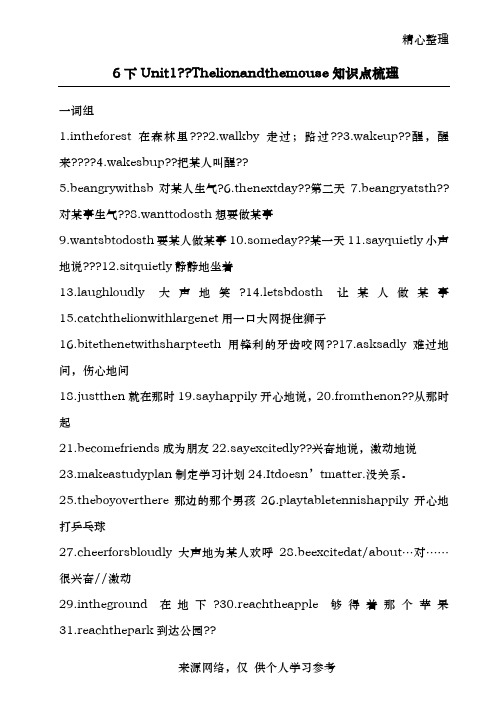
精心整理6下Unit1??Thelionandthemouse知识点梳理一词组1.intheforest在森林里???2.walkby走过;路过??3.wakeup??醒,醒来????4.wakesbup??把某人叫醒??5.beangrywithsb对某人生气?6.thenextday??第二天7.beangryatsth??对某事生气??8.wanttodosth想要做某事9.wantsbtodosth要某人做某事10.someday??某一天11.sayquietly小声地说???12.sitquietly静静地坐着ughloudly大声地笑?14.letsbdosth让某人做某事15.catchthelionwithlargenet用一口大网捉住狮子16.bitethenetwithsharpteeth用锋利的牙齿咬网??17.asksadly难过地问,伤心地问18.justthen就在那时19.sayhappily开心地说,20.fromthenon??从那时起21.becomefriends成为朋友22.sayexcitedly??兴奋地说,激动地说23.makeastudyplan制定学习计划24.Itdoesn’tmatter.没关系。
25.theboyoverthere那边的那个男孩26.playtabletennishappily开心地打乒乓球27.cheerforsbloudly大声地为某人欢呼28.beexcitedat/about…对……很兴奋//激动29.intheground在地下?30.reachtheapple够得着那个苹果31.reachthepark到达公园??32.haveanidea??有一个主意33.bringsomewaterquickly很快拿来水??34.pour…into….??把……倒入……35.Welldone.干得很好。
做的不错??36.somanyballs如此多的求37.somuchbread如此多的面包??????38.take…to…把…….带到…….39.becomehappy变得很开心40.getout 出来,出去二、难点句子1.?Thelionwasangryandwantedtoeatthemouse.这只狮子很生气想要吃那只老鼠。
6B-Unit1---The-lion-and-the-mouse知识点讲解及练习
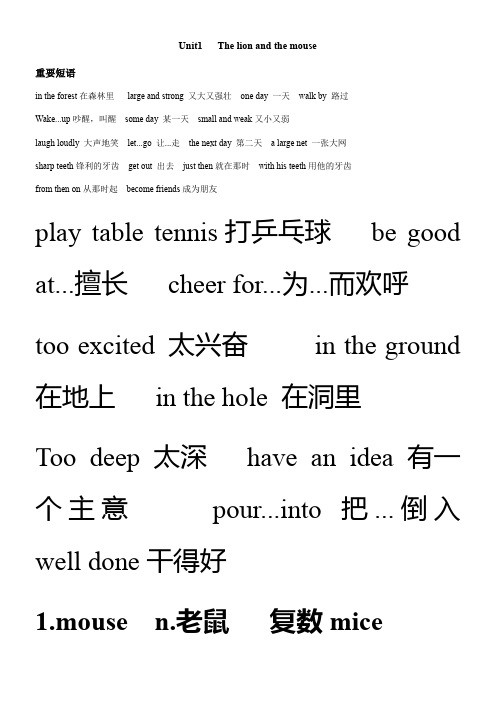
Unit1 The lion and the mouse重要短语in the forest在森林里large and strong 又大又强壮one day 一天walk by 路过Wake...up吵醒,叫醒some day 某一天small and weak又小又弱laugh loudly 大声地笑let...go 让...走the next day 第二天 a large net 一张大网sharp teeth锋利的牙齿get out 出去just then就在那时with his teeth用他的牙齿from then on从那时起become friends成为朋友play table tennis打乒乓球be good at...擅长cheer for...为...而欢呼too excited 太兴奋in the ground 在地上in the hole 在洞里Too deep 太深have an idea 有一个主意pour...into把...倒入well done干得好1.mouse n.老鼠复数mice【解析】mouse意为“老鼠”,其复数为mice;意为“鼠标”时,其复数为mouses。
【例句】A mouse is always afraid of acat.老鼠总是怕猫。
【例题】()There are some little in the hole.A.mouseB.miceC.mousesrge adj大的反义词small 近义词big大的;巨大的【解析】large常指面积、范围等,可表示数和量(当它直接用于人时,可表示身体大);big常指程度、规模、重量等,亦可指人,比较口语化。
【例句】(1)China is a large and beautiful country.中国是个幅员辽阔又美丽的国家。
(2)He is a big man.他是个大人物。
【例题】连词成句。
译林版 小学英语 6B Unit1 The lion and the mouse.docx 2.19

6B Unit1 The lion and the mouse单元教材分析本单元的主要教学内容是一则寓言故事。
要求学生能正确使用形容词和副词,同时复习一般过去时以及动词过去式。
涉及句型The lion asked sadly / laughed loudly / said happily / …为了使学生更好地掌握本单元的句型和词汇,教师在教学过程中应启发学生多观察、多运用,鼓励学生能从寓言故事中明白一定的道理。
学习目标知识目标1.能听得懂、会说、会读和会拼写单词large, strong, quietly, weak, loudly, happily2.能听得懂、会说、会读词汇mouse, walk by, wake … up, some day, let…go, the next day, net, bite, sharp, sadly, just then, soon, from then on, cheer, hit, deep, reach, pour … into, quickly3.能听得懂、会说、会读日常交际用语及句型The lion asked sadly / laughed loudly / said happily / …4.了解朗读中语调的基本要求5.了解国内外著名寓言故事集技能目标1. 能熟练运用一般过去时讲述英文故事2. 能运用所学句型及日常交际用语谈论人物的状态。
情感目标1、懂得信守承诺,再弱小的事物都有发挥大作用的时候。
2、学会从寓言故事中明白一定的道理。
学习重点:1.副词的构成及形容词和副词的正确使用。
2.四会词汇:large, strong, quietly, weak, loudly, happily3.语音:句子的升调和降调教学难点1. 形容词和副词的用法课时安排六课时第一课时Story time第二课时Story time II, Fun time,第三课时Grammar time, Checkout time(look and write)第四课时Culture time ,Cartoon time,第五课时Sound time, Checkout time(think and write)第六课时《练》和《补》讲评中山路共同体六年级英语教案课时:6B—6—1 课型:Story time 主备学校:中山路小学审核人:集备主讲:王莹使用学校:使用教师:执教时间:2.22【学习目标】★①能理解故事内容,熟读并根据重要词句复述。
牛津译林版六年级英语下册Unit1 The lion and the mouse 课件 2

3、Act in roles.
(分角色演)
lollipop
Task 5: Read and find
Where are you going? To the sweet shop.
What do you want to buy? A lollipop.
Who is it for?
The boy over there.
Fables and Chinese idiom books.
Do you want these balls?
每当你完成一个Task, 都可以向罐子里注入 一些水。
Task1: Revision
Fill in the blanks
One day, a _w__e_a_k_ mouse woke up the _s_t_ro_n_g_ lion. The lion caught the mouse and wanted to eat him. However, the lion _l_e_t__ the mouse go. The next day, the lion was c_a_u__g_h_t _ by men. The mouse made a hole and saved the lion.
打,击
( F ) 3. Sam and Bobby find a hole in the pglraoyugnrdound.
地面,地上
( F ) 4. Sam ccaannnot reach the ball in the hole.
够得着
Because the hole is too deep .
and Chinese idiom books.
Homework
新版译林英语六下6BUnit1Thelionandthemouse知识点梳理
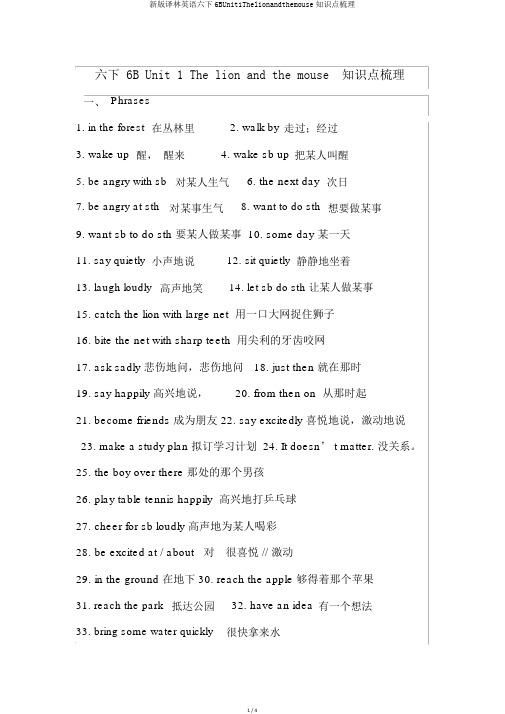
六下 6B Unit 1 The lion and the mouse 知识点梳理一、Phrases1. in the forest 在丛林里2. walk by 走过;经过3. wake up 醒,醒来4. wake sb up 把某人叫醒5. be angry with sb 对某人生气6. the next day 次日7. be angry at sth 对某事生气8. want to do sth 想要做某事9. want sb to do sth 要某人做某事 10. some day 某一天11. say quietly 小声地说12. sit quietly 静静地坐着13. laugh loudly 高声地笑14. let sb do sth 让某人做某事15.catch the lion with large net 用一口大网捉住狮子16.bite the net with sharp teeth 用尖利的牙齿咬网17. ask sadly 悲伤地问,悲伤地问18. just then 就在那时19. say happily 高兴地说,20. from then on 从那时起21. become friends 成为朋友 22. say excitedly 喜悦地说,激动地说23. make a study plan 拟订学习计划 24. It doesn’ t matter. 没关系。
25.the boy over there 那处的那个男孩26.play table tennis happily 高兴地打乒乓球27.cheer for sb loudly 高声地为某人喝彩28.be excited at / about 对很喜悦 // 激动29.in the ground 在地下30. reach the apple 够得着那个苹果31. reach the park 抵达公园32. have an idea 有一个想法33. bring some water quickly 很快拿来水34.pour into . 把倒入35.Well done. 干得很好。
最新译林版6b_unit1_教(学)案
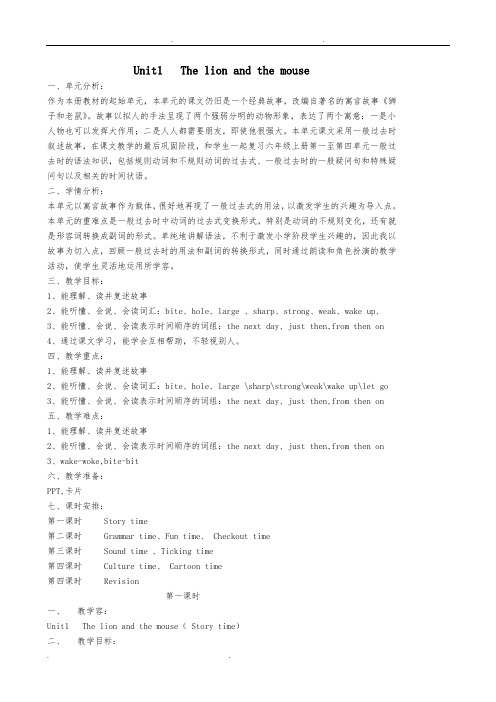
Unit1 The lion and the mouse一、单元分析:作为本册教材的起始单元,本单元的课文仍旧是一个经典故事,改编自著名的寓言故事《狮子和老鼠》。
故事以拟人的手法呈现了两个强弱分明的动物形象,表达了两个寓意:一是小人物也可以发挥大作用;二是人人都需要朋友,即使他很强大。
本单元课文采用一般过去时叙述故事,在课文教学的最后巩固阶段,和学生一起复习六年级上册第一至第四单元一般过去时的语法知识,包括规则动词和不规则动词的过去式、一般过去时的一般疑问句和特殊疑问句以及相关的时间状语。
二、学情分析:本单元以寓言故事作为载体,很好地再现了一般过去式的用法,以激发学生的兴趣为导入点。
本单元的重难点是一般过去时中动词的过去式变换形式,特别是动词的不规则变化,还有就是形容词转换成副词的形式。
单纯地讲解语法,不利于激发小学阶段学生兴趣的,因此我以故事为切入点,回顾一般过去时的用法和副词的转换形式,同时通过朗读和角色扮演的教学活动,使学生灵活地运用所学容。
三、教学目标:1、能理解、读并复述故事2、能听懂、会说、会读词汇:bite、hole、large 、sharp、strong、weak、wake up、3、能听懂、会说、会读表示时间顺序的词组:the next day、just then,from then on4、通过课文学习,能学会互相帮助,不轻视别人。
四、教学重点:1、能理解、读并复述故事2、能听懂、会说、会读词汇:bite、hole、large \sharp\strong\weak\wake up\let go3、能听懂、会说、会读表示时间顺序的词组:the next day、just then,from then on五、教学难点:1、能理解、读并复述故事2、能听懂、会说、会读表示时间顺序的词组:the next day、just then,from then on3、wake-woke,bite-bit六、教学准备:PPT,卡片七、课时安排:第一课时 Story time第二课时 Grammar time、Fun time、 Checkout time第三课时 Sound time 、Ticking time第四课时 Culture time、 Cartoon time第四课时 Revision第一课时一、教学容:Unit1 The lion and the mouse( Story time)二、教学目标:1.能理解并会朗读故事。
6B Unit1 The lion and the mouse知识点梳理(新译林英语)

6B Unit1 The lion and the mouse知识点梳理(新译林英语)六下6B Unit 1 The lin and the use 知识点梳理一、Phrases1 in the frest 在森林里2 al b 走过;路过3 ae up 醒,醒4 ae sb up 把某人叫醒be angr ith sb 对某人生气6 the next da 第二天7 be angr at sth 对某事生气8 ant t d sth 想要做某事9 ant sb t d sth 要某人做某事10 se da 某一天11 sa quietl 小声地说12 sit quietl 静静地坐着13 laugh ludl 大声地笑14 let sb d sth 让某人做某事1 ath the lin ith large net 用一口大网捉住狮子16 bite the net ith sharp teeth 用锋利的牙齿咬网17 as sadl 难过地问,伤心地问18 ust then 就在那时19 sa happil 开心地说,20 fr then n 从那时起21 bee friends 成为朋友22 sa exitedl 兴奋地说,激动地说23 ae a stud plan 制定学习计划24 It desn’t atter 没关系。
2 the b ver there 那边的那个男孩26 pla table tennis happil 开心地打乒乓球27 heer fr sb ludl 大声地为某人欢呼28 be exited at / abut… 对……很兴奋// 激动29 in the grund 在地下30 reah the apple 够得着那个苹果31 reah the par 到达公园32 have an idea 有一个主意33 bring se ater quil 很快拿水34 pur…int… 把……倒入……3 ell dne 干得很好。
六年级下册英语Unit 1 The lion and the mouseB译林版

Please don't eat me. I can help you some day.
The mous主e s语aid ,
动词 副词
Please don't eat me.
A. They can make things Icclaenarhleylpaynodu osormdeerdlayy..
Fairy Tales
Chinese Idiom book
Greece 希腊
a book from the Greek story teller,
Aesop.
The tortoise and the Hare The Fox and the Crow
The Fox and the Grape
Better late than never.
3. 与形容词同形:如 (early-early, fast-fast)
Look , guess and say
quickly / fast
happily/ loudly
excitedly
loudly
quietly
sadly
What is the story from?
A
B
C
Aesop's Fables 伊索寓言
walked by
Tip: We often use the past tense tobreecatmelel fariesntdosry.
laughed loudly
asked sadly
said happily
Read and feel
The mouse said q_u_i,etly The lion laughed _l_o_u,dly The lion asked s_a_d,ly The lion said hap__p,ily
新译林小学英语六下6B Unit 1 The lion and the mouse单元知识点 精编同步配套
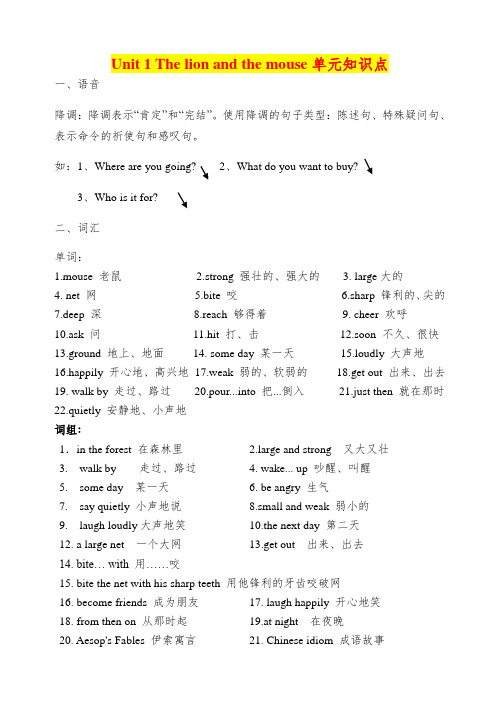
Unit 1 The lion and the mouse单元知识点一、语音降调:降调表示―肯定‖和―完结‖。
使用降调的句子类型:陈述句、特殊疑问句、表示命令的祈使句和感叹句。
如:1、Where are you going? 2、What do you want to buy?3、Who is it for?二、词汇单词:1.mouse 老鼠2.strong 强壮的、强大的3. large大的4. net 网5.bite 咬6.sharp 锋利的、尖的7.deep 深8.reach 够得着9. cheer 欢呼10.ask 问11.hit 打、击12.soon 不久、很快13.ground 地上、地面14. some day 某一天15.loudly 大声地16.happily 开心地、高兴地17.weak 弱的、软弱的18.get out 出来、出去19. walk by 走过、路过20.pour...into 把...倒入21.just then 就在那时22.quietly 安静地、小声地词组:1.in the forest 在森林里 rge and strong 又大又壮3. walk by 走过、路过4. wake... up 吵醒、叫醒5. some day 某一天6. be angry 生气7. say quietly 小声地说8.small and weak 弱小的9. laugh loudly大声地笑10.the next day 第二天12. a large net 一个大网13.get out 出来、出去14. bite… with 用……咬15. bite the net with his sharp teeth 用他锋利的牙齿咬破网16. become friends 成为朋友17. laugh happily 开心地笑18. from then on 从那时起19.at night 在夜晚20. Aesop's Fables 伊索寓言21. Chinese idiom 成语故事22. It doesn't matter. 没关系。
译林牛津六年级下册-第1讲-6BU1Thelionandthemouse(精英教案)

【课堂导学】1、上次课后巩固作业复习;2、互动探索Boys and girls, how much do you know about tigers and mice? What can they do?The lions are______________________________________________________________.They can__________________________________________________________________.The mice are_______________________________________________________________.They can__________________________________________________________________.参考答案:The lions are big and strong. They can run very fast. The mice are small, dirty and smart. They can make holes and eat things quietly.批注:引导学生说出老虎和老鼠的特征,以及它们会做的事情。
【知识点梳理】Story Time词汇和短语【知识梳理1】mouse老鼠短语:一只小老鼠____________________________看见一只老鼠_________________________一只快乐的老鼠__________________________复数:____________答案:a little mouse; see a mouse; a happy mouse; mice【例题精讲】例1. There are a lot of mice on the farm. 在农场上有很多老鼠。
新译林6Bunit1_The_lion_and_the_mouse Sally
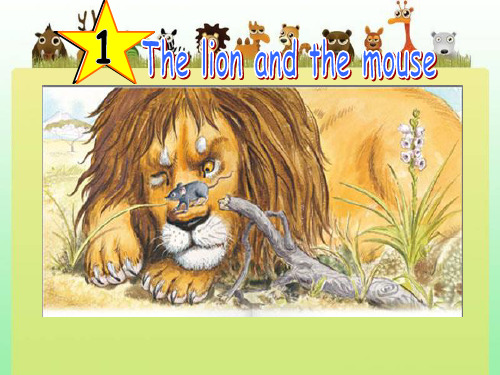
11. say quietly 小声地说
12. sit quietly 静静地坐着
13. laugh loudly 大声地笑
14. ask sadly 难过地问,伤心地问
adj - adv 形容词-副 词
15.say happily 开心地说
16. say excitedly 兴奋地说,激动地说
17. just then 就在那时
You are so small and weak. How can you help me? laughed the lion loudly.Then ,he let the mouse go.
•You are so small and weak. How can you help me? laughed the lion loudly.Then ,he let the mouse go.
Homework
1.听课文15分钟。 2、整理背诵课堂笔记。 3、完成小学总复习第16课时;预习专项2 5、家长签字。
• Do you like reading stories ? • Which stories do you like best ?
• First , Let's review the text and answer my question . • 1、Who woke the lion up ? • 2、Did the lion eat the mouse? • 3、How did the men catch the lion ? • 4、How did the mouse help the lion ? • 5、What did the lion and the mouse become ?
新译林6B Unit1-3复习及练习
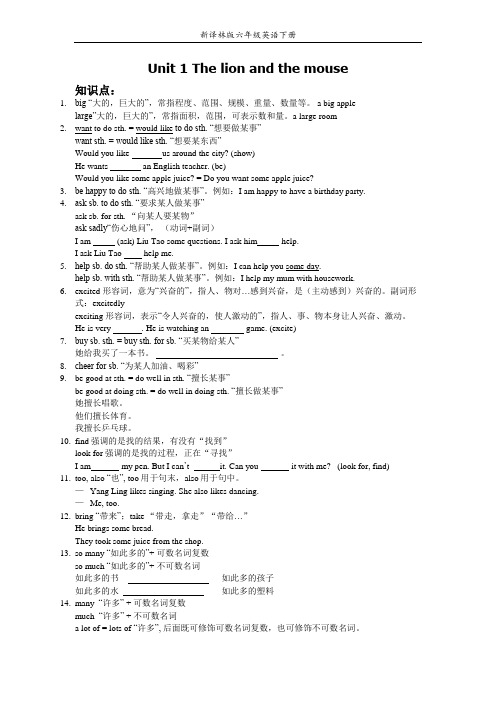
知识点:1.big “大的,巨大的”,常指程度、范围、规模、重量、数量等。
a big applelarge”大的,巨大的”,常指面积,范围,可表示数和量。
a large room2.want to do sth. = would like to do sth. “想要做某事”want sth. = would like sth. “想要某东西”Would you like us around the city? (show)He wants an English teacher. (be)Would you like some apple juice? = Do you want some apple juice?3.be happy to do sth. “高兴地做某事”。
例如:I am happy to have a birthday party.4.ask sb. to do sth. “要求某人做某事”ask sb. for sth. “向某人要某物”ask sadly“伤心地问”,(动词+副词)I am (ask) Liu Tao some questions. I ask him help.I ask Liu Tao help me.5.help sb. do sth. “帮助某人做某事”。
例如:I can help you some day.help sb. with sth. “帮助某人做某事”。
例如:I help my mum with housework.6.excited 形容词,意为“兴奋的”,指人、物对…感到兴奋,是(主动感到)兴奋的。
副词形式:excitedlyexciting 形容词,表示“令人兴奋的,使人激动的”,指人、事、物本身让人兴奋、激动。
He is very . He is watching an game. (excite)7.buy sb. sth. = buy sth. for sb. “买某物给某人”她给我买了一本书。
最新译林版6B英语 Unit 1 The lion and the mouse 重点词汇句型复习与整理
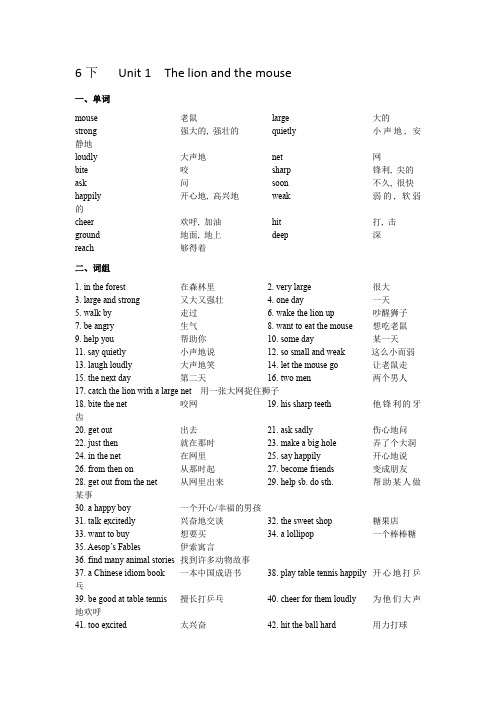
6下Unit 1 The lion and the mouse一、单词mouse 老鼠large 大的strong 强大的, 强壮的quietly 小声地, 安静地loudly 大声地net 网bite 咬sharp 锋利, 尖的ask 问soon 不久, 很快happily 开心地, 高兴地weak 弱的, 软弱的cheer 欢呼, 加油hit 打, 击ground 地面, 地上deep 深reach 够得着二、词组1. in the forest 在森林里2. very large 很大3. large and strong 又大又强壮4. one day 一天5. walk by 走过6. wake the lion up 吵醒狮子7. be angry 生气8. want to eat the mouse 想吃老鼠9. help you 帮助你10. some day 某一天11. say quietly 小声地说12. so small and weak 这么小而弱13. laugh loudly 大声地笑14. let the mouse go 让老鼠走15. the next day 第二天16. two men 两个男人17. catch the lion with a large net 用一张大网捉住狮子18. bite the net 咬网19. his sharp teeth 他锋利的牙齿20. get out 出去21. ask sadly 伤心地问22. just then 就在那时23. make a big hole 弄了个大洞24. in the net 在网里25. say happily 开心地说26. from then on 从那时起27. become friends 变成朋友28. get out from the net 从网里出来29. help sb. do sth. 帮助某人做某事30. a happy boy 一个开心/幸福的男孩31. talk excitedly 兴奋地交谈32. the sweet shop 糖果店33. want to buy 想要买34. a lollipop 一个棒棒糖35. Aesop’s Fables 伊索寓言36. find many animal stories 找到许多动物故事37. a Chinese idiom book 一本中国成语书38. play table tennis happily 开心地打乒乓39. be good at table tennis 擅长打乒乓40. cheer for them loudly 为他们大声地欢呼41. too excited 太兴奋42. hit the ball hard 用力打球43. find the ball 找到球44. find a hole in the ground 在地上找到一个洞45. in the hole 在洞里46. too deep 太深47. can’t reach it 够不着它48. have an idea 有一个主意49. bring some water quickly很快拿来一些水50. pour it into the hole 把它倒进洞里51. so many balls 这么多球52. go to a shopping centre 去购物中心53. see a small boy 看见一个小男孩54. on the floor 在地板上55. take him to an office 带他去办公室56. give him a sweet 给他一颗糖57. become happy 变得高兴58. like helping people 喜欢帮助人们59. make a study plan 制定一个学习计划60. read quietly 安静地看书61. a weak animal 一个弱小的动物62. a sharp knife 一把锋利的刀63. walk by 走过, 路过64. wake . . . up 吵醒, 叫醒65. some day 某一天66. the next day 第二天67. just then 就在那时68. get out 出来, 出去69. from then on 从那时起70. pour… into把…. . . 倒入三、重点句型1. One day, a mouse walked by and woke the lion up. 一天, 一只老鼠走过, 吵醒了狮子。
最新6B-Unit1---The-lion-and-the-mouse知识点讲解及练习

Unit1 The lion and the mouse重要短语in the forest在森林里large and strong 又大又强壮one day 一天walk by 路过Wake...up吵醒,叫醒some day 某一天small and weak又小又弱laugh loudly 大声地笑let...go 让...走the next day 第二天 a large net 一张大网sharp teeth锋利的牙齿get out 出去just then就在那时with his teeth用他的牙齿from then on从那时起become friends成为朋友play table tennis打乒乓球be good at...擅长cheer for...为...而欢呼too excited 太兴奋in the ground在地上in the hole 在洞里Too deep 太深have an idea 有一个主意pour...into把...倒入well done干得好1.mouse n.老鼠复数mice【解析】mouse意为“老鼠”,其复数为mice;意为“鼠标”时,其复数为mouses。
【例句】A mouse is always afraid of a cat.老鼠总是怕猫。
【例题】()There are some little in the hole.A.mouseB.miceC.mousesrge adj大的反义词small 近义词big大的;巨大的【解析】large常指面积、范围等,可表示数和量(当它直接用于人时,可表示身体大);big 常指程度、规模、重量等,亦可指人,比较口语化。
【例句】(1)China is a large and beautiful country.中国是个幅员辽阔又美丽的国家。
(2)He is a big man.他是个大人物。
【例题】连词成句。
- 1、下载文档前请自行甄别文档内容的完整性,平台不提供额外的编辑、内容补充、找答案等附加服务。
- 2、"仅部分预览"的文档,不可在线预览部分如存在完整性等问题,可反馈申请退款(可完整预览的文档不适用该条件!)。
- 3、如文档侵犯您的权益,请联系客服反馈,我们会尽快为您处理(人工客服工作时间:9:00-18:30)。
1 . Read and try to recite the story . 2. Try to act the story with your friends.
From then on, the lion and the mouse became friends.
从今以后
d
a
e
c
f
b
Let’s think:
1.Why the lion laughed at the mouse? Because he thought… 2.Does the lion laugh at the mouse now? Why? Because he knows — even the littlest mouse can help the biggest Lion. 即使是最小的老鼠也能帮助最大的狮子。
The lion was angry and wanted to eat the mouse.
Look and read
“Please don’t eat me. I can help you some day,” said
the mouse quietly. “You’re so small and weak! How can you help me? laughed the lion loudly. Then, he let the mouse go.
My mother ___ me __ every morning.
One day, the mouse ___ the lion ___ .
Look and read
There was a lion in the forest. He was very large and strong.
One day, a mouse walked by and woke the lion up.
Free talk:
4.What animals do you like? cat
lion
animals
tiger
eห้องสมุดไป่ตู้ephant
a lion large and strong
强壮的
a mouse small and weak
虚弱的
Who woke the lion up?
A mouse woke the lion up. wake 的过去式 wake…up 唤醒… do exercise
let的过去式
Look and read
• The next day, two men caught the lion with a large net. 网 The lion bit the net with his sharp teeth, but that did not help. “How can I get out?” asked the lion sadly.
bite的过去式,咬
尖锐的
Look and read
• Just then, the mouse saw the lion. “I can help you,” he said. Soon, the mouse made a big hole in the net with his teeth. 洞 The lion got out. “Thank you!”
